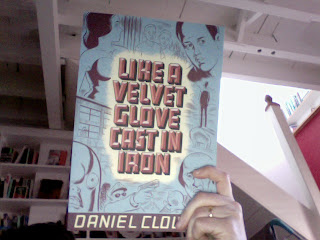The Sisters Brothers (2011) by
Patrick deWitt
Recommended by Craig
Fresh from
university, what is an English Literature graduate to do?
Work in Oddbins, of
course.
Ah, Oddbins. Already
consigned to history. Part of a time when we used to go to different shops to
buy different things, and where the people who worked in those shops knew about
the stuff they were flogging. It seems unbelievably quaint already, but Oddbins
really did care that its staff knew their wine: they’d put us on tasting
courses, have events where we’d sample new vintages, and quietly accept the odd
stock ‘irregularity’.
Craig was Assistant Manager
at my branch of Oddbins, Notting Hill. He liked classic cinema and modern
literature, he liked singer-songwriters and expensive whiskey. He had the
world’s worst memory, but he could reel off scenes from minor Hitchcock movies,
and he’d be accurate to the frame.
We hit it off very
quickly.
Craig left Notting Hill
for Manchester a few months later. I visited him. He had this gorgeous flat in Chorlton
with high, high, ceilings and no curtains. It all felt very bijou, well apart from the person in the
flat underneath playing The Verve’s Urban
Hymns six times a day (no exaggeration). I made Craig a tape (tape!) of the
best songs from Elliott Smith’s first three albums; I complained how Elliott
had ‘gone rubbish’ with XO. We ate
pancakes at a pancake house for breakfast.
We also watched films. Perhaps
it was that weekend, or perhaps it was on a later occasion, Craig and I watched
Fargo. I’d never seen it, and it was
one of his favourites.
It was Fargo that kept coming back to me as I was
reading The Sisters Brothers.
Something in its manner, its language, its imagery (and, of course, the thought of Craig).
I felt a sharp pain at the long toe of my left foot. I
upended and tapped at the heel of the boot, expecting a nettle to drop, when a
large, hairy spider thumped to the ground on its back, eight arms pedalling in
the cold air.
The Sisters Brothers concerns Eli (who
narrates) and Charlie Sisters, two feared hitmen in the American frontiers of
the 1850s, a time of gold rush and lawlessness. The pair work for the
Commodore, and he has ordered the death of Hermann Warm. As is standard for the
Commodore, he doesn’t tell his henchmen what the unfortunate Warm has done, and
this is increasingly troubling to Eli.
Despite his profession,
Eli is a sensitive man. He has a loyal relationship with his good-natured but
useless horse, Tub, and refuses to be rid of him, even when Tub is aged and
brain-damaged. Eli is also self-conscious about his weight, and forces himself
onto a hated diet.
I ate a small portion of eggs and beans and was still
very hungry when I was finished. I sat looking at the greasy plate, wishing,
frankly, to lick it.
[…]
The boy returned and asked if I wanted anything more
before paying up. ‘Fresh pie this morning,’ he said.
‘What kind of pie?’ I demanded. I thought, don’t let it be cherry.
‘Cherry,’ said the boy.
These aspects of The Sisters Brothers could easily turn Eli,
and the book itself, into something cuddly and safe. But he, and it, is neither.
Violence jolts through the brothers’ quest, and Eli is as much a willing part
of that as Charlie is.
Charlie himself is hard to
like at the start, for he seems to exploit his younger brother, blindly follow
the Commodore’s instructions, and rob and kill without compunction. But he has
the driest humour, and soon I became very fond of Charlie, too.
‘What’s that? You’re not smiling are you? We’re in a
quarrel and you mustn’t under any circumstances smile.’ I was not smiling, but
then began to, slightly. ‘No,’ said Charlie, ‘you mustn’t smile when
quarrelling. It’s wrong, and I dare say you know it’s wrong. You must stew and
hate and revisit all the slights I offered you in childhood.’
The first half of the book
is comprised mainly of vignettes such as these: scrapes on the brothers’ way to
tracking down Hermann Warm. But when they find their target, the tone of the
book changes. The brutality had been plentiful, casual and bloody up to this
point. Now it is charged with deep philosophical questions, as Eli and Charlie
realise why they’ve been told to murder Warm. The differences between the two halves of the book is akin to the contrast between
the kaleidoscope gore of The Evil Dead and
the depressing savagery of Henry:
Portrait Of A Serial Killer. Sometimes, with a narrative shift such as
this, it can seem as if the author is belatedly trying to tack on a measure of
depth to a story, but here it’s exactly the opposite. It feels natural, if
upsetting, that the story goes where it does: again, this is something that the
Coen Brothers, at their best, are extremely good at.
The other clear reference
point for me was Deadwood. I watched
the first season of this a couple of years back, and once I got over thinking
‘it’s Lovejoy!’ every time Ian McShane appears, I thought it was
fan-fucking-tastic.
'That's what the fuck life is, one vile fucking task after another.'
Yes, DeWitt likes Deadwood very much.
However, I think The Sisters Brothers has a wider appeal than Deadwood, even. It’s
readable, it’s got ballast, it revels in moments of black farce and its
characters – even the minor ones – are extraordinarily vivid. I can’t think of
any literary comparisons for this book; partly this is due to my ignorance of
the Western genre, but also its something in the book itself.
I bet this will be a film, and probably an Oscar contender. Read it before the 'now a major motion picture' cover makes you too embarrassed to.


















